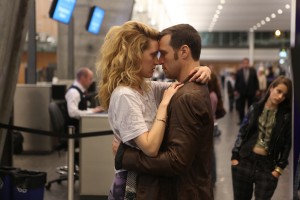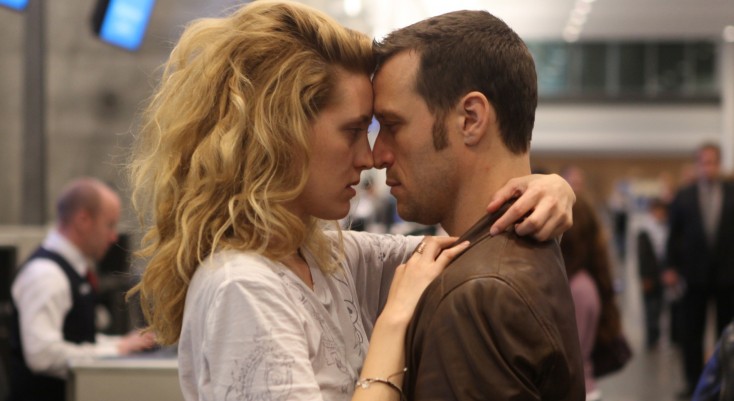
Rose (Evelyn Brochu) and Antoin (Kevin Parent) — shadowed by his disapproving young daughter Angeline (Rosalie Fortier) — share a tender embrace as the successful DJ prepares to depart for Europe in “Cafe de Flore.” ©Adopt Films.
By JAMES DAWSON
Front Row Features Film Critic
Beautifully shot, well directed, impressively acted and imaginatively edited, “Café de Flore” unfortunately concludes with a regrettable third act that undercuts the film’s picturesque melodrama with a ridiculously mystical revelation. That insultingly unsatisfying climax seems designed to justify the transgressions of shamelessly cheating husbands, while telling betrayed ex-wives that they got what they deserved in the cosmic scheme of things. Even for a French-language film, that’s an oddly misogynistic moral.
It’s too bad the screenplay (by director Jean-Marc Vallée) takes that narrative nosedive, because until then it’s hard not to get caught up in the film’s two distinctly separate storylines, or to wonder how they possibly can connect. Vanessa Paradis plays Jacqueline, a struggling single mother raising a son named Laurent (Marin Gerrier) who has Down Syndrome in 1960s Paris. Obsessed with and defensive about Laurent, Jacqueline tries mainstreaming him into an elementary school where he causes disruptions and can’t keep up. Laurent becomes clingingly devoted there to Véro, a girl his age who also has Down Syndrome. Her parents eventually try convincing Jacqueline that both children should be institutionalized in a special-needs facility, but Jacqueline stubbornly rejects the idea.
In present-day Montreal, first-class-flying DJ stud Antoine (Kevin Parent) has a feline-foxy blond girlfriend named Rose (Évelyne Brochu), but shares custody of two daughters with his reconciliation-fantasizing ex Carole (Hélène Florent). Although their story seems to have nothing in common and no shared characters with the Paris plot, subliminal flashbacks to Jacqueline and Laurent’s world keep popping into Carole’s mind.
Paradis is excellent as the overwhelmed but desperately maternal Jacqueline, who is both attentively saintly yet psychotically overprotective of her son. Gerrier perfectly conveys Laurent’s innocent love for his mother and his inability to understand why he and Véro can’t be together constantly.
In the Montreal plot, Parent is good at showing Antoine’s self-righteous annoyance at not being able to have his cake and eat it too. His parents disagree with his decision to leave his wife for the other woman that his resentful teenage daughter calls a “bimbo.” Even though he got to keep the luxurious house with the pool after the split and insists on public displays of affection with his trophy tart, Antoine can’t seem to figure out why he’s regarded as a cad.
Florent has the film’s most difficult role as ex-wife Carole, a sleepwalking and self-medicating piece of damaged goods who may be cracking up. Carole also has to be flakey enough to seek an unlikely form of spiritual guidance, and to believe what she hears.
The movie’s troublesome ending is roughly equivalent to an “it was all a dream” copout. That weird and weak wrap-up may actually have made more sense if it had been presented that way, instead of as a bizarre but convincing-even-to-the-skeptical truth that everyone seemingly accepts.
As a result, “Café de Flore” goes down like a well-presented and intriguingly prepared two-course meal topped off by a disappointing dessert that leaves an unexpectedly sour aftertaste.




